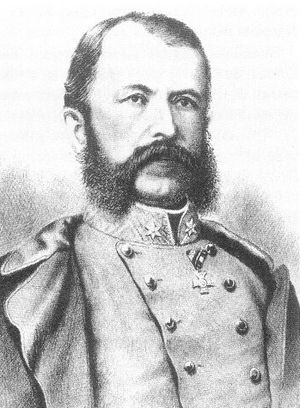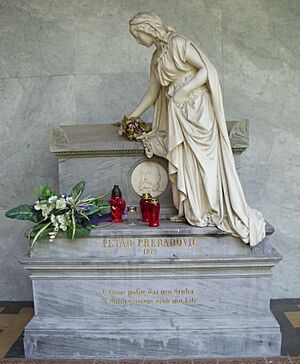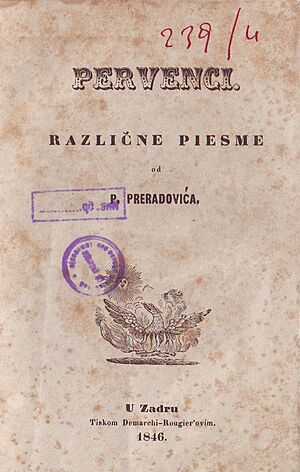Petar Preradović facts for kids
Quick facts for kids
Petar Preradović
|
|
|---|---|
 |
|
| Born | 19 March 1818 Grabrovnica, Croatian Military Frontier, Austrian Empire |
| Died | 18 August 1872 (aged 54) Fahrafeld, Archduchy of Austria, Austria-Hungary |
| Resting place | Mirogoj, Zagreb, Croatia |
| Occupation | Poet, military officer |
| Language | Croatian |
| Citizenship | Austro-Hungarian |
| Period | Romanticism |
| Genre | Poetry |
| Subject | Patriotism |
| Literary movement | Illyrian Movement |
| Children | 8 |
| Relatives | Paula von Preradović (granddaughter) Otto Molden (great-grandson) |
Petar Preradović (born March 19, 1818 – died August 18, 1872) was an important Croatian poet, writer, and military general. He was one of the most famous Croatian poets of the 19th century. He was also a key figure in the Illyrian movement and a main representative of romanticism in Croatia.
He was also the grandfather of Paula von Preradović, an Austrian writer and poet. She is well-known for writing the words to the Austrian national anthem.
Contents
Early Life and Education
Petar Preradović was born in a village called Grabrovnica. This village was near Pitomača in what is now Croatia. At that time, it was part of the Croatian Military Frontier. This was a special border region of the Austrian Empire.
His father passed away in 1828. Like many young men from the Military Frontier, Petar decided to become a professional soldier. He joined a military academy in Bjelovar. Later, he went to another academy in Wiener Neustadt. He was a very good student there.
During his training, Petar changed his religion from Eastern Orthodox to Catholicism. This was common for soldiers in the academy at the time. While studying, he started writing his first poems in German. These poems showed signs of the romanticism style.
A Poet and a Soldier
After finishing his military training, Petar was sent to Milan, Italy. There, he met Ivan Kukuljević Sakcinski, another officer from Croatia. Ivan inspired Petar to start writing in his native Croatian. This made Petar very interested in Croatian culture and its future.
Later, Petar was stationed in Zadar. Here, he wrote his first song in Croatian. It was called Poslanica Špiri Dimitroviću. His writings were published in a local Croatian newspaper called Zora dalmatinska in 1846.
He then visited Zagreb and met leaders of the Illyrian movement. This movement aimed to unite South Slavs and promote Croatian culture. Petar wrote a famous song for the first issue of Zora dalmatinska in 1844. The song, "Zora puca, bit će dana" (Dawn is breaking, day will come), spoke about a new, hopeful era for the Croatian people. From then on, he continued to write poetry in Croatian. He also supported the official use of Ljudevit Gaj's grammar in southern Croatia.
In 1848, Petar was back in Italy. He took part in the Wars of Italian Unification. He later moved to Zagreb and worked in the military department of the government. In 1851, he became a deputy commander and aide to Ban Josip Jelačić. Petar Preradović became a general in 1866.
His health began to decline in late 1871. Petar Preradović passed away on August 18, 1872. He was first buried in Vienna. However, his remains were later moved to Mirogoj cemetery in Zagreb in 1879. This was a special event for the Croatian people. The mayor of Zagreb, August Šenoa, gave a moving speech at his reburial. A monument showing Croatia as a woman laying flowers on his grave was created by sculptor Ivan Rendić.
Petar Preradović had eight children. His granddaughter, Paula von Preradović, became a famous Austrian poet. She wrote the words to the Austrian national anthem.
His Poetry and Translations
Petar Preradović's first poems were written in German while he was at the military academy. His meeting with Ivan Kukuljević Sakcinski in 1840 was a turning point. It encouraged him to write in Croatian, his native language. His first Croatian poem was Poslanica Špiri Dimitroviću in 1843. His first published Croatian song, "Zora puca, bit će dana," appeared in 1844. Preradović remained a key figure in Croatian romanticism.
Besides writing his own poems, Preradović was also a talented translator. He translated works from German, Italian, French, and English into Croatian. He also translated Croatian works into German. He knew German, Italian, French, English, and almost all Slavic languages.
Important Works
- Pervenci (Firstlings), Zadar, 1846.
- Nove pjesme (New Poems), Zagreb, 1851.
- Prvi ljudi (First People), 1862.
- Opera libreto Vladimir i Kosara (an opera story in 4 acts)
- Lopudska sirotica (The Orphan Girl from Lopud)
- Pustinjak (The Hermit)
Works Published After His Death
Many of his works were published after he passed away, including:
- Pjesnička djela Petra Preradovića (Poetic Works of Petar Preradović), Zagreb, 1873.
- Izabrane pjesme (Selected Poems), Matica hrvatska, Zagreb, 1890.
- Djela Petra Preradovića (Works of Petar Preradović), volume 2, Zagreb, 1918–1919.
- Preradovićeva pisma Vatroslavu Bertiću (Preradović's Letters to Vatroslav Bertić), HAZU, Zagreb, 1950.
- Rodu o jeziku (To the Nation about Language), Grabrovnica, 1972.
Images for kids
-
A statue of Petar Preradović at the Preradović square in Zagreb
See also
 In Spanish: Petar Preradović para niños
In Spanish: Petar Preradović para niños
- Lavoslav Vukelić







